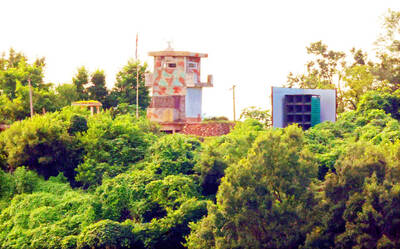A North Korean civilian voluntarily crossed the heavily mined land border between it and South Korea, aided by the South’s military in a delicate 20-hour operation, Seoul’s Joint Chiefs of Staff (JCS) said yesterday.
Tens of thousands of North Koreans have fled to South Korea since the peninsula was divided by war in the 1950s, with most going overland to neighboring China first, then entering a third country such as Thailand before finally making it to the South.
Defections across the land border that divides the peninsula are relatively rare, as the area is densely forested, heavily mined and monitored by soldiers on both sides.

Photo: AP
The North Korean man was first detected by a South Korean military surveillance device some time between 3am and 4am on Thursday near a shallow stream inside the demilitarized zone (DMZ), the Joint Chiefs of Staff said.
The man stayed mostly still during the day and was sometimes hard to track due to the lush forest in the area, the JCS said, but South Korea’s military approached him that night.
“The military identified the individual near the military demarcation line [MDL], conducted tracking and surveillance,” the JCS said in a statement. The MDL is the de facto border.
The MDL runs through the middle of the DMZ — the border area separating the two Koreas, which is one of the most heavily mined places on earth.
Seoul’s military then “successfully carried out a standard guiding operation to secure custody,” the JCS said.
The mission involved a considerable number of South Korean troops and took place in an area difficult to navigate due to dense vegetation and landmine risks, it said.
When the man first noticed the approaching South Korean troops, he asked: “Who are you?” it said.
The soldiers responded: “We are the South Korean military. We’ll guide you to safety,” it added. Upon hearing this, the man crossed the MDL and joined the troops, who then escorted him south out of the DMZ.
The operation took about 20 hours, the JCS said, adding that “relevant authorities” would investigate the detailed circumstances of the incident.
North Koreans are typically handed over to Seoul’s intelligence agency for screening when they arrive in the South.
Ahn Chan-il, a defector-turned-researcher who runs the World Institute for North Korea Studies at the Global Peace Foundation, said the man is likely a farmer who had been working near the DMZ.
If so, the man could have sensed the conciliatory mood between the two Koreas, Ahn said, as loudspeaker broadcasts from both sides — K-pop and international news from the South, and eerie, unsettling sounds from the North — have recently ceased.
“The lush summer vegetation within the DMZ likely offered the best cover for a high-risk escape,” he said.
“Crossing the DMZ is an extremely dangerous act due to the presence of unmarked mines. It was a bold, risky move — and in this case, somehow, with a lot of luck, he succeeded,” he added.
The incident comes after a North Korean soldier defected to the South by crossing the MDL in August last year. Also last year, another North Korean defected to the South across the de facto border in the Yellow Sea, arriving on Gyodong Island off the peninsula’s west coast near the border between the Koreas.
The number of successful escapes by North Korean defectors dropped significantly from 2020 after the North sealed its borders — purportedly with shoot-on-sight orders along the land frontier with China — to prevent the spread of COVID-19.
No unusual activities by the North Korean military have been detected, the JCS said.
South Korean President Lee Jae-myung, who took office last month, has vowed a more dovish approach toward Pyongyang compared with his hawkish predecessor Yoon Suk-yeol.
“Politics and diplomacy must be handled without emotion and approached with reason and logic,” Lee said on Thursday. “Completely cutting off dialogue is really a foolish thing to do.”

Philippine President Ferdinand Marcos Jr has fired his national police chief, who gained attention for leading the separate arrests of former Philippine president Rodrigo Duterte on orders of the International Criminal Court and televangelist Apollo Carreon Quiboloy, who is on the FBI’s most-wanted list for alleged child sex trafficking. Philippine Executive Secretary Lucas Bersamin did not cite a reason for the removal of General Nicolas Torre as head of the 232,000-member national police force, a position he was appointed to by Marcos in May and which he would have held until 2027. He was replaced by another senior police general, Jose

POWER CONFLICT: The US president threatened to deploy National Guards in Baltimore. US media reports said he is also planning to station troops in Chicago US President Donald Trump on Sunday threatened to deploy National Guard troops to yet another Democratic stronghold, the Maryland city of Baltimore, as he seeks to expand his crackdown on crime and immigration. The Republican’s latest online rant about an “out of control, crime-ridden” city comes as Democratic state leaders — including Maryland Governor Wes Moore — line up to berate Trump on a high-profile political stage. Trump this month deployed the National Guard to the streets of Washington, in a widely criticized show of force the president said amounts to a federal takeover of US capital policing. The Guard began carrying

Ukrainian drone attacks overnight on several Russian power and energy facilities forced capacity reduction at the Kursk Nuclear Power Plant and set a fuel export terminal in Ust-Luga on fire, Russian officials said yesterday. A drone attack on the Kursk nuclear plant, not far from the border with Ukraine, damaged an auxiliary transformer and led to 50 percent reduction in the operating capacity at unit three of the plant, the plant’s press service said. There were no injuries and a fire sparked by the attack was promptly extinguished, the plant said. Radiation levels at the site and in the surrounding

‘DELIBERATE PROVOCATION’: Pyongyang said that Seoul had used a machine gun to fire at North Korean troops who were working to permanently seal the southern border South Korea fired warning shots at North Korean soldiers that briefly crossed the heavily fortified border earlier this week, Seoul said yesterday after Pyongyang accused it of risking “uncontrollable” tensions. South Korean President Lee Jae-myung has sought warmer ties with the nuclear-armed North and vowed to build “military trust,” but Pyongyang has said it has no interest in improving relations with Seoul. Seoul’s military said several North Korean soldiers crossed the border on Tuesday while working in the heavily mined demilitarized zone (DMZ) separating the two Koreas. The incursion prompted “our military to fire warning shots,” South Korea’s Joint Chiefs of Staff